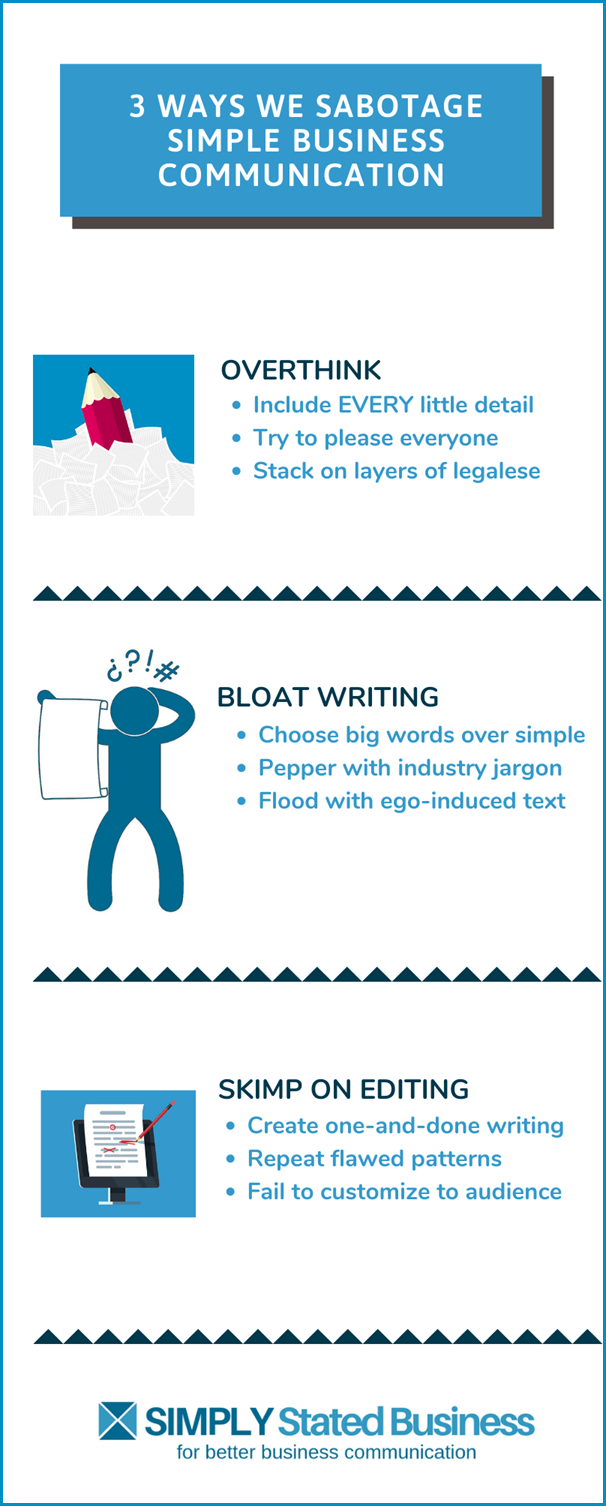 Keep it simple. How many times have you heard that phrase (with or without the stupid part)?
Keep it simple. How many times have you heard that phrase (with or without the stupid part)?
You probably embrace the concept. Unfortunately, the theory seems unclear to much of the business world. Especially when it comes to business communication.
Why is simple so hard? Because we make it that way.
The Keep It Simple Design
The originator of the K.I.S.S. (Keep It Simple, Stupid) principle was a Lockheed engineer. Who knew science was at the heart of K.I.S.S.?
- He was also a creator of spy planes (how cool is that?)
- His K.I.S.S. theory – a simple design system is easier to manage
Are you thinking, Duh?
- Is simple really that – well – simple?
- Or does it take an engineer to keep it simple?
3 Ways To Sabotage Simple and How To Fix It
If the creator of spy planes can keep it simple, why shouldn’t we be able to do the same for our business communication? The graphic below illustrates three common ways we sabotage simple right out of our business communication.
1. Business communicators tend to OVERTHINK what readers need to know in one communication piece.
It’s like watching the presidential debate.
- You tune in to hear the position of the candidates on specific topics
- What you get is a whole lot of nasty “stuff” that you have no interest in
- And you walk away very confused without a clear response to the topics
In an effort to please voters, candidates spin through their Rolodex of responses, often burying the audience in contradictions.
Think about your own business communication.
- Is it overly complex?
- Are there too many ideas? Too many dang words?
- Are you trying too hard to please everyone? Readers? Department heads? The legal department?
The Fix: Figure out WHO your audience is and WHAT they need to know NOW.
2. BLOAT WRITING in business communication adds pounds to the content and clogs understanding.
- Do readers need a decoder ring to translate industry jargon?
- Are you using acronyms without explaining them?
- Is your business content more about you than the reader you hope to attract?
The Fix: Focus on WHO your audience is and err on the side of SIMPLE explanation.
3. Deadlines, competition, and our fast-paced business world has communicators SKIMPING ON EDITING.
That’s a mistake.
I get it. I’m as guilty as the next person, but a good lesson I learned from Henneke Duistermaat’s blog, Enchanting Marketing, is how satisfying editing can be. No, really.
Henneke views editing as a game. She has fun with what she’s written. Check out Henneke’s tips on self-editing.
Make editing a delectable dessert. Ask yourself these editing questions.
- Do you run out the publication door with an unchecked first draft?
- What are your repeat offenders in grammatical and writing oops?
- Is your business communication a generic one-size-fits-all?
The Fix: Savor the finest EDITING has to offer to ENHANCE your reader’s experience.
A Simple Ending
How do you keep it simple? Share your tips in Comments.
==================================
NOTE: This is an update of a blog post originally published on October 6, 2010, updated on October 17, 2016, and once again on March 3, 2020. I guess simple bears repeating. 🙂



okay, I’ll admit it… I sometimes play with acronyms. I never ever use attorney language, especially in my own letters of agreement. And I’m often accused of writing short.
Like your rules… good ones.
Acronyms are okay when you explain them. I used to stump more than one insurance vet when I would ask what an acronym stood for. They had been around so long no one could remember. 🙂
Writing short is good! Of course, I may be a tad prejudiced. Thanks for stopping by, Anne, and for the RT-oops-acronym-ReTweet. 🙂
These are great ideas for most folks. But some of us are lost in the ether, so we need to run the Fog Index test on our publications. Because we don’t see where we lose the general populace, at all.
Always knew you were unique, Roy. 😉 Your topics are typically way more complex than mine. Were you an engineer, too? 🙂